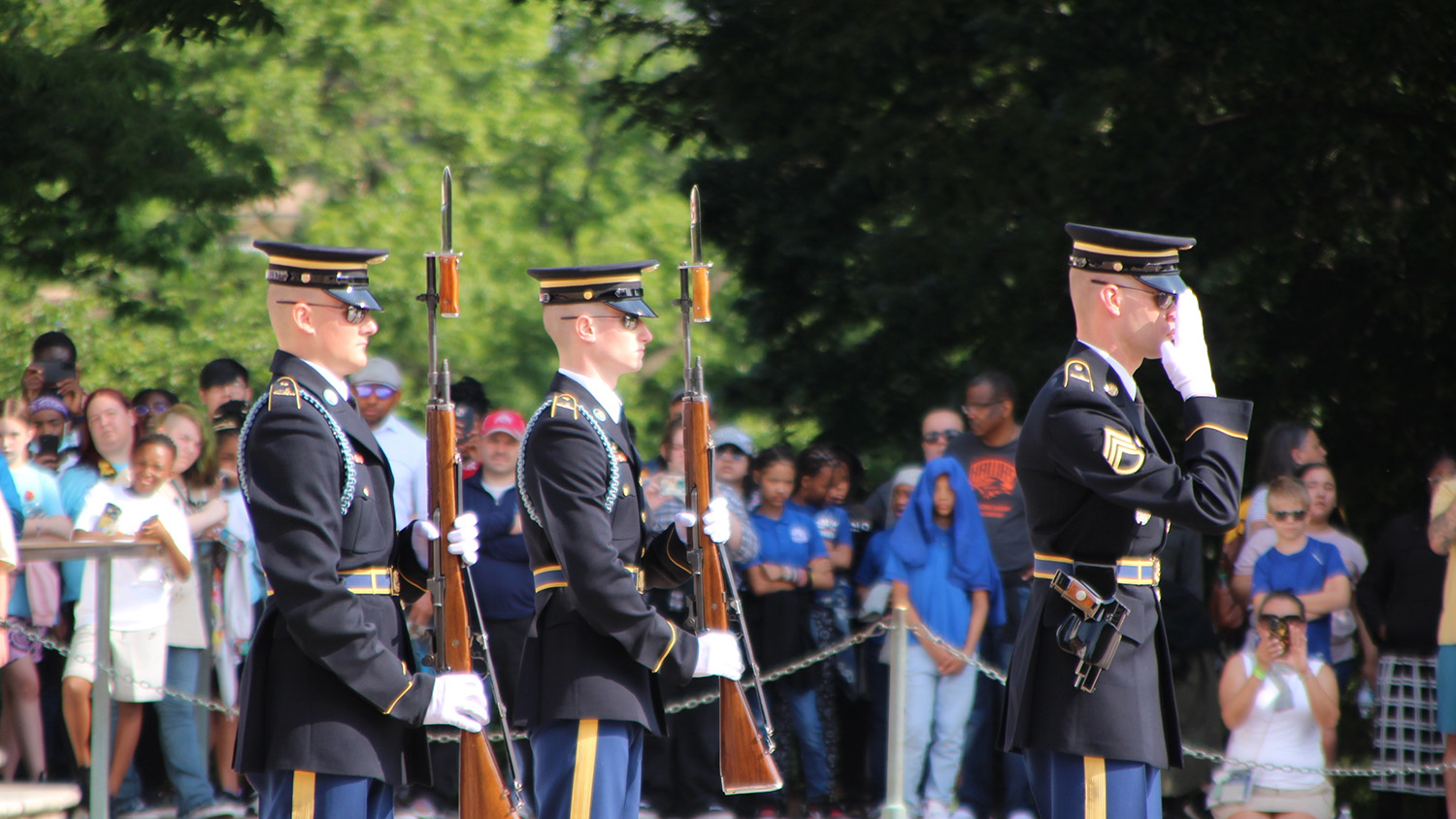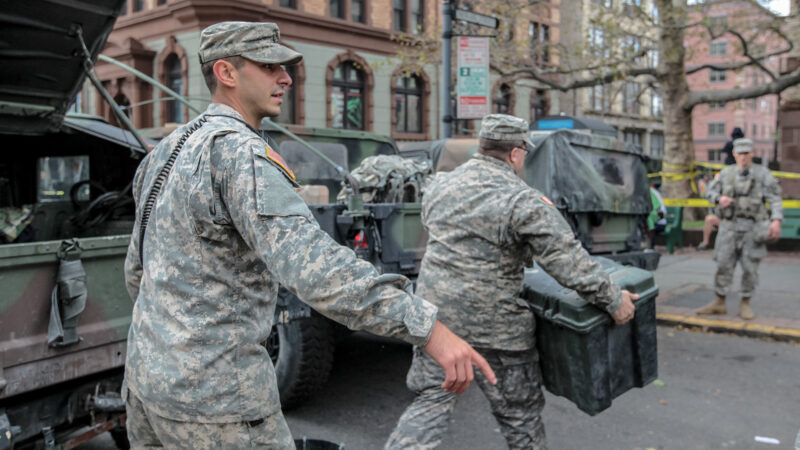The Insurrection Act and National Guard authorities, explained
- September 10, 2024

A central hallmark of American democracy is that, with tightly limited exceptions, the U.S. military is not used here at home. Autocrats often deploy military force to quash dissent, target vulnerable communities, and corrupt elections. Such outbreaks can offer political cover for restrictions on civil liberties or the expansion of coercive security measures.
More: Service secretaries and retired four-star admirals and generals file amicus brief on Los Angeles military deployment More: Service secretaries and retired four-star admirals and generals file amicus brief on Los Angeles military deployment
The Constitution makes the president the Commander-in-Chief of our armed forces, but establishes Congress as the branch in control of the military’s domestic activities. Congress has passed statutory constraints on domestic deployment that go beyond what is required by the Constitution, intended to prevent the chief executive from abusing the awesome power of the military — overseas or, especially, on American streets. These laws reflect long standing American wariness, dating back to the Declaration of Independence, around domestic use of the military.
The most important of these laws is the Posse Comitatus Act (PCA), passed in 1878, which bars members of the federal armed forces from participating in civilian law enforcement activities unless doing so has been “expressly authorized” by Congress. There are, however, narrow exceptions and loopholes to these laws. Two in particular are of concern: the Insurrection Act and the president’s authority over the National Guard.
The Insurrection Act
The Insurrection Act is one of a number of ways that an authoritarian-minded president can deploy and abuse the military domestically outside of the constraints of the Posse Comitatus Act. The Insurrection Act authorizes the president to use the military at home to engage in civilian law enforcement in certain situations. The language of the Act — which first dates back to 1792 — permits the president to use the federal military domestically to suppress “any insurrection, domestic violence, unlawful combination, or conspiracy.” These antiquated terms are not defined in the statute. Moreover, an 1827 Supreme Court decision held that the president alone decides when to invoke the Act because he is “presumed to act in obedience to his duty.” (There are limits in some circumstances.) And unlike earlier iterations of the law, Congress is given no formal role in signing off on these deployments nor are there any time restrictions that limit their duration.
Last updated over 150 years ago, the Insurrection Act is badly in need of reform. The current law on the books contains antiquated and ambiguous language that confers broad authority to the president to deploy the military domestically without meaningful checks and balances. Earlier this year, a bipartisan group of experts convened by the American Law Institute recommended a set of principles to govern Insurrection Act reform, and the Brennan Center for Law and Justice has authored a detailed proposal to reform the law in order to prevent future presidential abuse.
National Guard Authorities
As a patchwork of state and territory-based militias, the Guard has a unique structure: it is the only branch of the U.S. military that has both state and federal responsibilities, and, as a result, can be controlled by either state or federal leaders, depending upon their deployment status. There are three deployment types of the National Guard:
- State Active Duty (SAD) status: Under SAD, the National Guard carries out state-defined missions at the state’s expense and serves under the command and control of the state or territory’s chief executive. In these operations, governors are largely free to use the Guard forces as they see fit, free from the constraints of the Posse Comitatus Act (PCA). State Active Duty deployments often occur in response to emergencies, civil disturbances, and other reasons authorized by state law, and are historically the most common form of National Guard deployment. Past examples include the responses to the Oklahoma city bombing in 1995 and the Kansas tornadoes in 2011.
- Title 32 (or “hybrid”) status: The Guard can be deployed in a hybrid status under Title 32 of the U.S. Code for state-based and some federally-defined missions, which are often training exercises. While still under the command and control of their governor or chief executive, National Guard personnel operating in Title 32 status are paid by the federal government and receive federal benefits. Past, non-training uses of Title 32 status have included providing post-9/11 airport security, conducting relief operations after natural disasters such as Hurricane Katrina, and providing support to U.S. Customs and Border Protection at the U.S.-Mexico border.
- Title 10 status: When called up under Title 10 of the U.S. Code, National Guard units are “called into federal service” — or “federalized” — by the president, and placed under federal command and control just as if the Guard personnel were members of the regular armed forces. As a consequence, federalized National Guard personnel are bound by the Posse Comitatus Act unless a statutory exception applies, such as the Insurrection Act. Federalized Guard troops have been used everywhere from Little Rock, Arkansas in 1957 to the U.S.-Mexico border today.
Notably, in the District of Columbia, unlike in every other state or federal territory, the National Guard is always under the command and control of the president, even when not federalized. This arrangement is a holdover from the era before D.C. had its own government. As a result, the president can deploy the D.C. Guard for law enforcement purposes without following the procedures under the Insurrection Act. It can also prevent timely deployment of the Guard during a crisis, as we saw on January 6, 2021.
Within this legal structure, there are dangerous gaps and loopholes in the laws that authorize and regulate the Guard’s domestic activities.
Read more: Understanding domestic National Guard missions Read more: Understanding domestic National Guard missions
How domestic deployment authorities have been abused in recent years
In June 2020, President Trump deployed the D.C. Guard in response to racial justice protests in Washington, D.C. He also asked several governors to send their own National Guard forces into D.C. against the wishes of the D.C. mayor Muriel Bowser. This large force of National Guard troops was used to perform a domestic policing function under presidential control, all without any statutory authorization. In a letter to D.C. mayor Bowser, Attorney General William Barr offered an unprecedented interpretation of the law as a legal basis for the deployment of the out-of-state National Guard troops. He argued that Title 32 authorizes state governors to deploy their National Guard to perform any conceivable mission requested by the president, even if that means sending their Guardsmen into another jurisdiction without that jurisdiction’s consent. Furthermore, President Trump threatened to activate active-duty military troops across the country and pre-positioned the Army’s 82nd Airborne Division outside the nation’s capital, ready to deploy into the city at a moment’s notice.
On January 6, 2021, D.C. faced nearly the opposite problem: the D.C. National Guard was slow to deploy during a crisis because of continued federal control over its deployment. In every American state, as well as Guam, Puerto Rico, and the U.S. Virgin Islands, National Guard forces are subject to gubernatorial control unless and until the president calls them into federal service. But in D.C., the National Guard remains subject to permanent federal control. On January 6th, this meant that the D.C. mayor could not quickly dispatch the D.C. Guard to reinforce Capitol Police and D.C. Metropolitan Police officers attempting to defend the U.S. Capitol. Instead, the need to seek federal approval of the D.C. Guard’s deployment resulted in a delay of several hours. The Guard did not arrive at the Capitol until after 5 p.m., at which point both chambers of Congress already had been secured.
These events demonstrate the urgent need for reforms to clarify its command structure for domestic deployment, outline how and when the National Guard may (or may not) be deployed domestically and make clear the Guard’s legal authority when it acts.
Read more: How to reform domestic deployment authorities ck Read more: How to reform domestic deployment authorities
Related Content
It can happen here.
We can stop it.
Defeating authoritarianism is going to take all of us. Everyone and every institution has a role to play. Together, we can protect democracy.
Donate
Sign Up for Updates Sign Up for Updates
Explore Careers Explore Careers
How to Protect Democracy How to Protect Democracy



